Past events
Professor Leslie A. Pal at the 17th Annual Conference
Prof. Leslie A. Pal recently attended the 17th Annual Conference of the Network of Institutes and Schools of Public Administration in Central and Eastern Europe (NISPAcee) in Budva, Montenegro. He delivered two papers. The first was part of the Working Sessions on the Main Conference theme, and its title was “The OECD and Public Management Reform.” The second was part of a special panel series on Policy Analysis and Development Issues, and was entitled “Policy Analysis at the Cutting Edge: What’s New?”
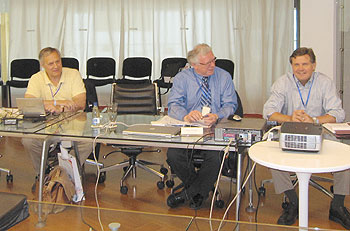
Prof. Pal with David Elder (chair, Queen’s University)
and Prof. David Amborski (Ryerson University)
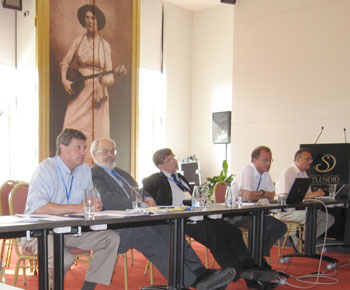
Prof. Pal with B. Guy Peters (co-chair, University of Pittsburgh)
and Prof. Juraj Nemec (co-chair, University of Matej Bel, Slovakia)
Professor Leslie A. Pal in Doha
Professor Leslie A. Pal was recently invited (April 14-30, 2009) by the Qatar Foundation’s Faculty of Islamic Studies (QFIS) (http://www.qf.org.qa/output/page284.asp) to deliver lectures to several classes of graduate students pursuing an MA in Public Policy in Islam. He delivered three lectures to the Faculty, on policy networks, program evaluation, and policy analysis in the real world. He also delivered two public lectures to the wider Qatar Foundation community, on “The End of Small Government? The Impact of the Global Financial Crisis” and “Good Governance: The OECD View.”
Professor Pal also discussed joint research projects between CGPM and QFIS. In 2009 the two partners will develop a project on “Governance: Western and Islamic Perspectives,” and plan a workshop in Doha in Spring 2010. Plans for student exchanges were also discussed, as was the possibility of executive training programs in strategic management and sustainable energy.
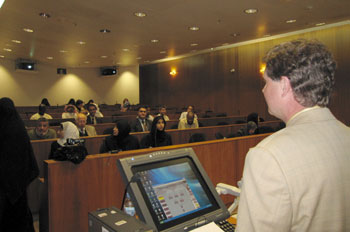
Dr. Pal delivering public lecture at Qatar Foundation
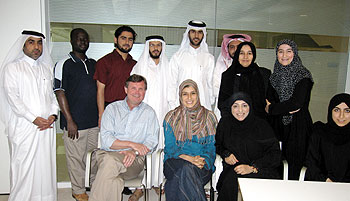
Dr. Pal and Dr. Basma Abdelgafar and her MA in Public Policy class
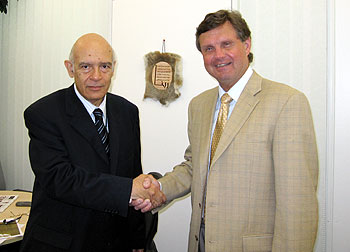
Dr. Pal and Dean of the Qatar Faculty of Islamic Studies,
Dr. Hatem El Karanshawy
Piotr Dutkiewicz – Duma
Piotr Dutkiewicz was testifying as an expert witness for the Duma (Russian Parliament) on 23-24 March, 2009 on a draft law on culture; he was working with Duma legal Committee on applicability of the Canadian multiculturalism for Russia and institutional and legal applicability of the Canadian experience within PAR Program (Public Administration Reform project run by Canada School of Public Service and Russian Presidential Administration and funded by CIDA); this work was based on the previous research that was conducted in 2007-2008 by the group of Canadian – Russian researches on the legal aspects of multicultural education in Russia and Canada.
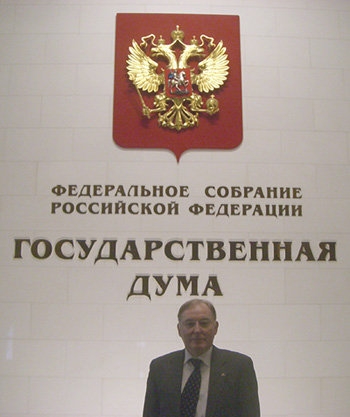
Piotr Dutkiewicz at the main entrance Hall of the Russian Duma
Workshop on Policy Development in Mongolia
Professor Leslie A. Pal led a three-day workshop in February in Ulaan Baator for the Open Society Forum (OSF). The focus was on policy development, policy design, implementation, and analysis. Participants included successful applicants to the OSF program, which has been in place for four years. They submit initial proposals for policy change in Mongolia in a variety of fields, and after the workshop submit a refined proposal that then becomes the basis for policy research leading towards a policy paper/brief that will contribute to policy dialogue in Mongolia. Information about the OSF may be found at www.forum.mn.
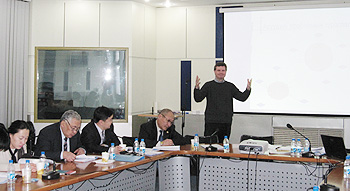
Professor Leslie A. Pal teaching workshop
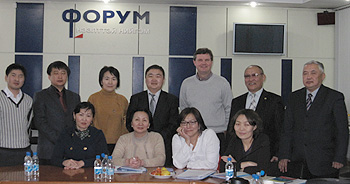
Professor Leslie A. Pal and Students
McGill Institute for the Study of Canada Conference, March 26-27, 2009
Professor Leslie A. Pal was a panel speaker at a recent McGill conference entitled “Public Policy in Crisis? Understanding Policy-Making in Canada.” The panel was devoted to the issue of innovation and new policy ideas. Prof. Pal argued that Canada relies more than other countries on external advisory councils, committees, task forces, and that the generation of new, innovative ideas from within the system is relatively rare. However, he also noted that there is a new generator of ideas — networks. These networks are often global and comprise a host of actors: governmental, NGOs, think tanks, researchers, international bodies. More information about the conference may be found at www.mcgill.ca/policyincrisis.
Conference: Managing Governance Technical Assistance in Russia-Lessons Learned and Future Direction
The Center for Governance and Public Management (CGPM) at Carleton University is dedicated to training and research related to public sector reform and education in developing countries around the world. It has for many years worked closely with the Russian Academy of Public Administration, and this relationship has prompted reflection on what works and what does not work in the realm of governance technical assistance.
At the same time, it was unclear what direction Canadian government policy (through the Canadian International Development Agency [CIDA] and the Department of Foreign Affairs and International Trade [DFAIT]) would take on technical assistance to the Russian Federation, particularly as pertains to governance technical assistance.
CGPM saw an opportunity to do something unique: bring together government officials from CIDA and DFAIT with representatives of the key Canadian executing agencies to frankly discuss their experiences as well as future challenges and opportunities. With the support of Universalia, CGPM decided to hold a one-day, invitation-only workshop on the theme “Managing Governance Technical Assistance in Russia: Lessons Learned and Future Directions.” The workshop was held on February 5, 2009, at Carleton University, with 26 participants.
Piotr Dutkiewicz
Leslie A. Pal
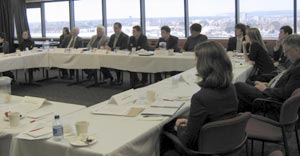
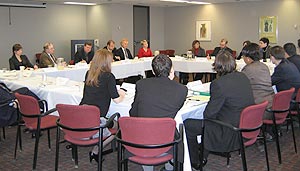
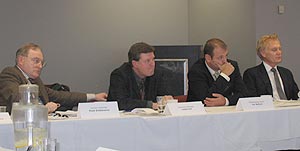
Joint CGPM-AUCC University Governance Project in Botswana
The Centre was contracted by the Association of Universities and Colleges of Canada (AUCC) to help the Botswana Ministry of Education to establish a second National Technical University. A group of Carleton senior administrators and faculty are engaged in developing academic policies, student management and enrolment planning, and academic services. The University, which will start to enroll its first students in 2012, will be the flagship of Botswana’s growing economy and will enroll 12,000 students by 2016. The Centre will be working on this project until March 2009.